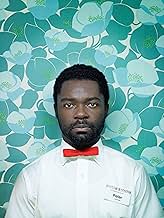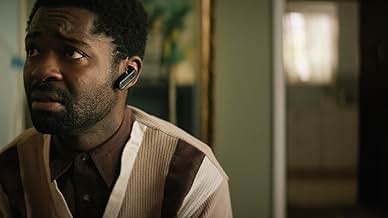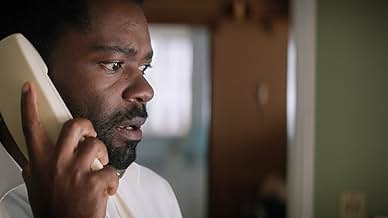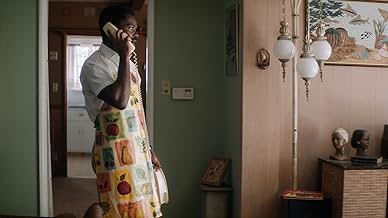IMDb-BEWERTUNG
6,4/10
2084
IHRE BEWERTUNG
Füge eine Handlung in deiner Sprache hinzuA lonely war veteran psychologically unravels ahead of an old friend's impending visit.A lonely war veteran psychologically unravels ahead of an old friend's impending visit.A lonely war veteran psychologically unravels ahead of an old friend's impending visit.
- Regie
- Drehbuch
- Hauptbesetzung
- Für 2 Primetime Emmys nominiert
- 4 Gewinne & 12 Nominierungen insgesamt
Barlow Jacobs
- Robert Beasley
- (Synchronisation)
Heather Storm
- Newscaster
- (Synchronisation)
Handlung
WUSSTEST DU SCHON:
- WissenswertesDavid Oyelowo stated that ,"For the three weeks we shot the film, I didn't come out of character."
- Zitate
[Last lines]
Peter Snowden: Come, Lord Jesus. Come.
Ausgewählte Rezension
Never mind Gus Van Sant's ill-advised 1998 remake: here is our ideal 21st century adaptation of Psycho. Instead of custodianship, our contemporary Norman Bates directs his spiteful and playfully sulky jabs to Mother through a video blog while eagerly preparing for guests, yet is shown to be just as fraying in sanity. But there's nothing mad about Nightingale, which ticks along with absorbing insistence, unspooling its familiar narrative of obsession and yearning with deftness and ease.
Any single actor show is always a commitment, but director Elliot Lester keeps the proceedings lively and engaging, with cameras mesmerizingly gliding through every last inch of Peter Snowden's house, while the disjuncture between long, still takes and rapid cutting empathetically mirror his manic shifts in energy, even blurring the frame imperceptibly in solidarity with his drunkenness. Writer Frederick Mensch employs every conceit in the book to stave off stagnation (including a choice HBO gag the film's original viewership must have relished). He motivates Snowden's monologuing and teasing crucial exposition through key props and devices, including his mother's makeup mirror, phone conversations, prayer, and his vlogging interludes, each teasing out distinct strands of personality coalescing into a disturbed but wholly realized individual. Meanwhile, Mark D. Todd's score lends an uneasy serenity to the surroundings, as the film creeps along with a thinly veiled false sense of security.
Story-wise, which enraptures its unravelling protagonist with The Glass Menagerie's anticipation of a gentleman caller of sorts, there are few surprises, but the inevitability with which events transpire is bittersweet in itself. But beyond this cursory human experience, which is affecting enough, there's not much by way of thematic subtext. Childhood trauma and military service are teased, but left as largely self-evident, while it's unclear if the collusion in the character names "Edward" and "Snowden" is meant to imply any sort of commentary (the dichotomy between his isolated loneliness and his consistent filming and publicizing his stream-of-consciousness monologues?), but it's either clumsily implemented or vaguely distractingly gimmicky.
As such, the film is worthwhile primarily as a showcase of its lead, the magnificent David Oyelowo. Nearly unrecognizable from his star-making turn as MLK in Selma, Oyelowo, carrying virtually every frame of the film, is comparably superbly magnetic here. Sashaying through mood swings (and hair styles) encompassing outrageously silly to pouty to vitriolic and destructive, Oyelowo masterfully conjures energy through his constant tension between frenzied movement and stillness, all the while carrying a wealth of achingly sympathetic unspoken backstory in his increasingly bloodshot eyes. It's a spectacular turn, and if, granted, he's the predominant draw and purpose Nightingale, he alone is easily well worth the experience.
-7.5/10
Any single actor show is always a commitment, but director Elliot Lester keeps the proceedings lively and engaging, with cameras mesmerizingly gliding through every last inch of Peter Snowden's house, while the disjuncture between long, still takes and rapid cutting empathetically mirror his manic shifts in energy, even blurring the frame imperceptibly in solidarity with his drunkenness. Writer Frederick Mensch employs every conceit in the book to stave off stagnation (including a choice HBO gag the film's original viewership must have relished). He motivates Snowden's monologuing and teasing crucial exposition through key props and devices, including his mother's makeup mirror, phone conversations, prayer, and his vlogging interludes, each teasing out distinct strands of personality coalescing into a disturbed but wholly realized individual. Meanwhile, Mark D. Todd's score lends an uneasy serenity to the surroundings, as the film creeps along with a thinly veiled false sense of security.
Story-wise, which enraptures its unravelling protagonist with The Glass Menagerie's anticipation of a gentleman caller of sorts, there are few surprises, but the inevitability with which events transpire is bittersweet in itself. But beyond this cursory human experience, which is affecting enough, there's not much by way of thematic subtext. Childhood trauma and military service are teased, but left as largely self-evident, while it's unclear if the collusion in the character names "Edward" and "Snowden" is meant to imply any sort of commentary (the dichotomy between his isolated loneliness and his consistent filming and publicizing his stream-of-consciousness monologues?), but it's either clumsily implemented or vaguely distractingly gimmicky.
As such, the film is worthwhile primarily as a showcase of its lead, the magnificent David Oyelowo. Nearly unrecognizable from his star-making turn as MLK in Selma, Oyelowo, carrying virtually every frame of the film, is comparably superbly magnetic here. Sashaying through mood swings (and hair styles) encompassing outrageously silly to pouty to vitriolic and destructive, Oyelowo masterfully conjures energy through his constant tension between frenzied movement and stillness, all the while carrying a wealth of achingly sympathetic unspoken backstory in his increasingly bloodshot eyes. It's a spectacular turn, and if, granted, he's the predominant draw and purpose Nightingale, he alone is easily well worth the experience.
-7.5/10
Top-Auswahl
Melde dich zum Bewerten an und greife auf die Watchlist für personalisierte Empfehlungen zu.
- How long is Nightingale?Powered by Alexa
Details
- Laufzeit1 Stunde 23 Minuten
- Farbe
Zu dieser Seite beitragen
Bearbeitung vorschlagen oder fehlenden Inhalt hinzufügen











